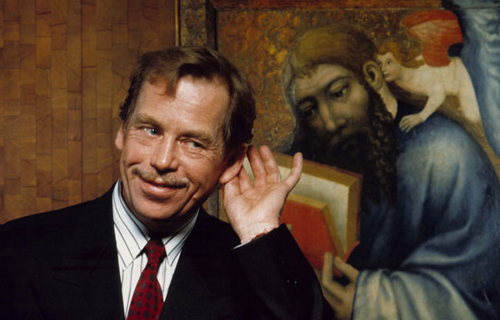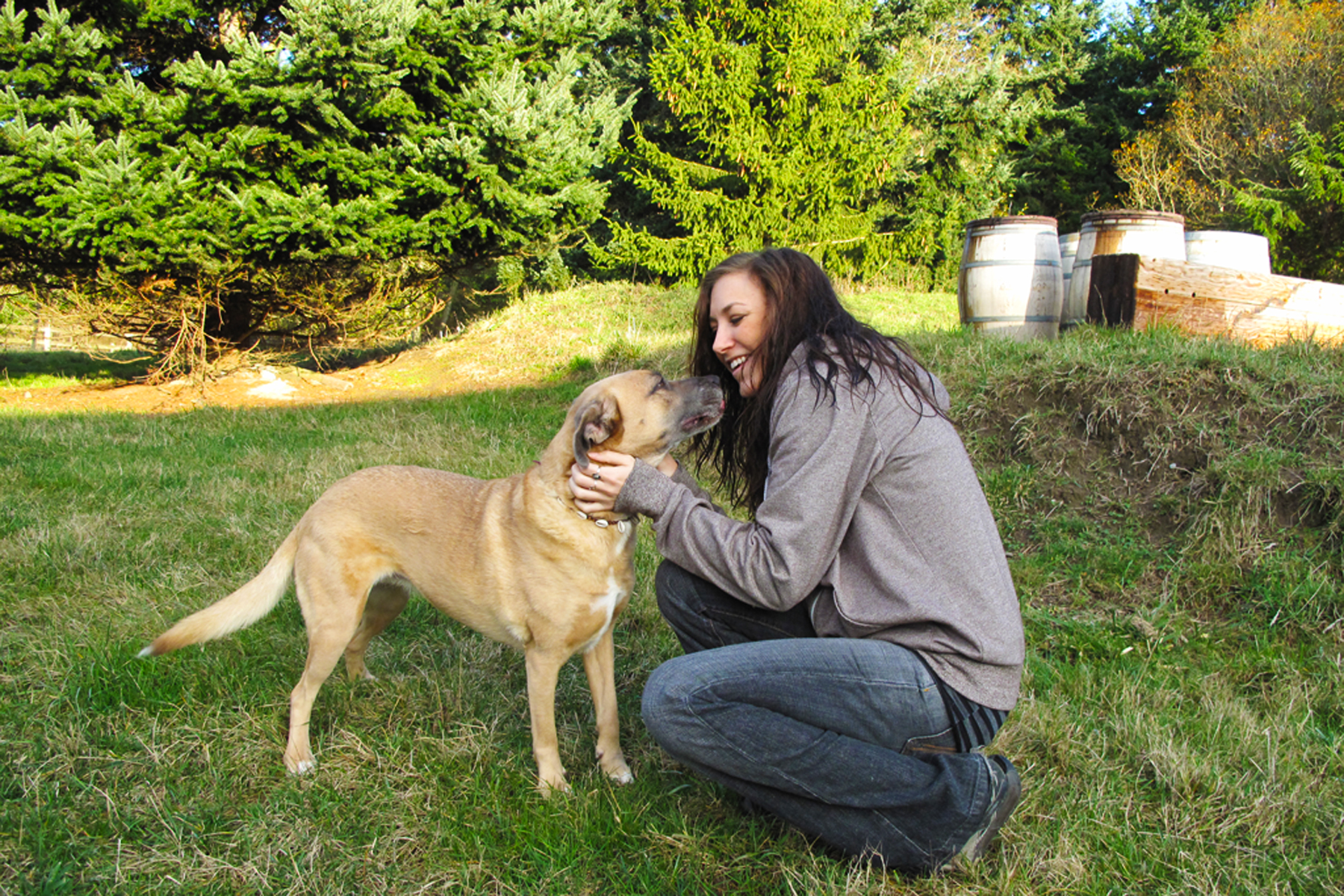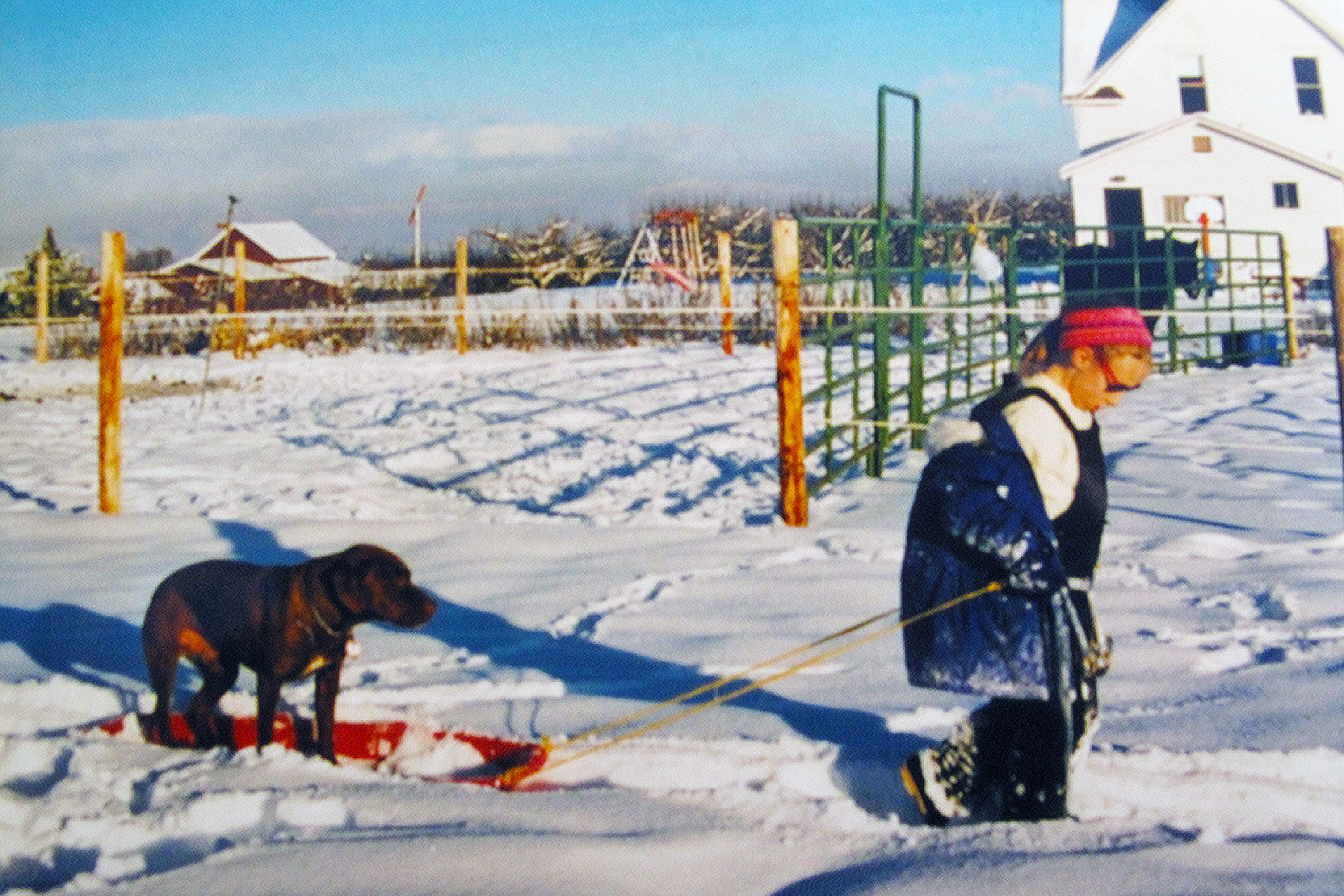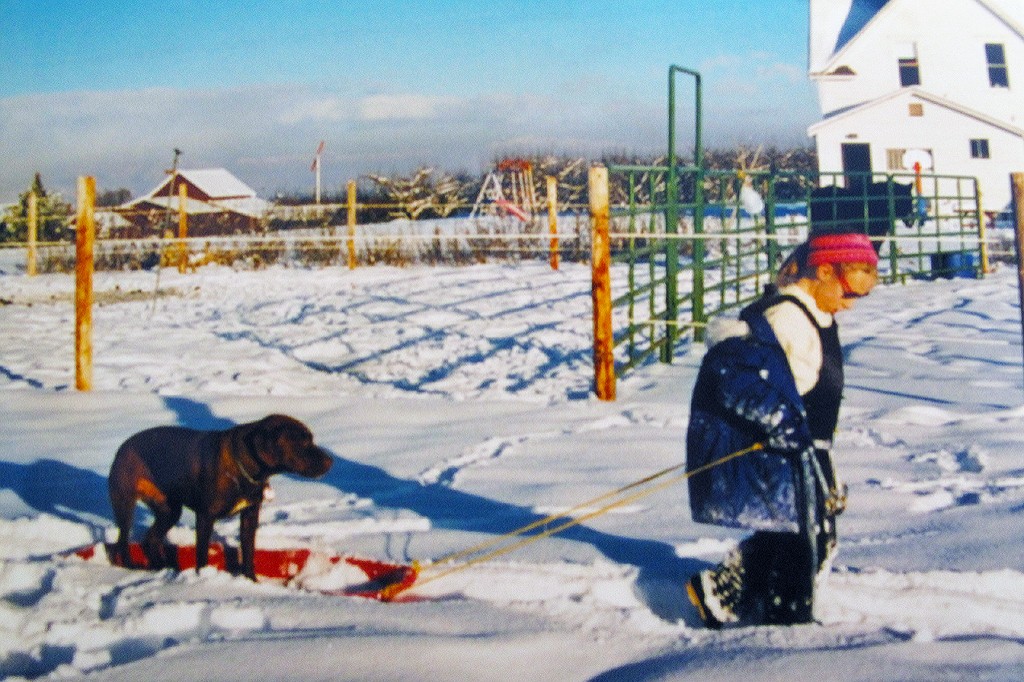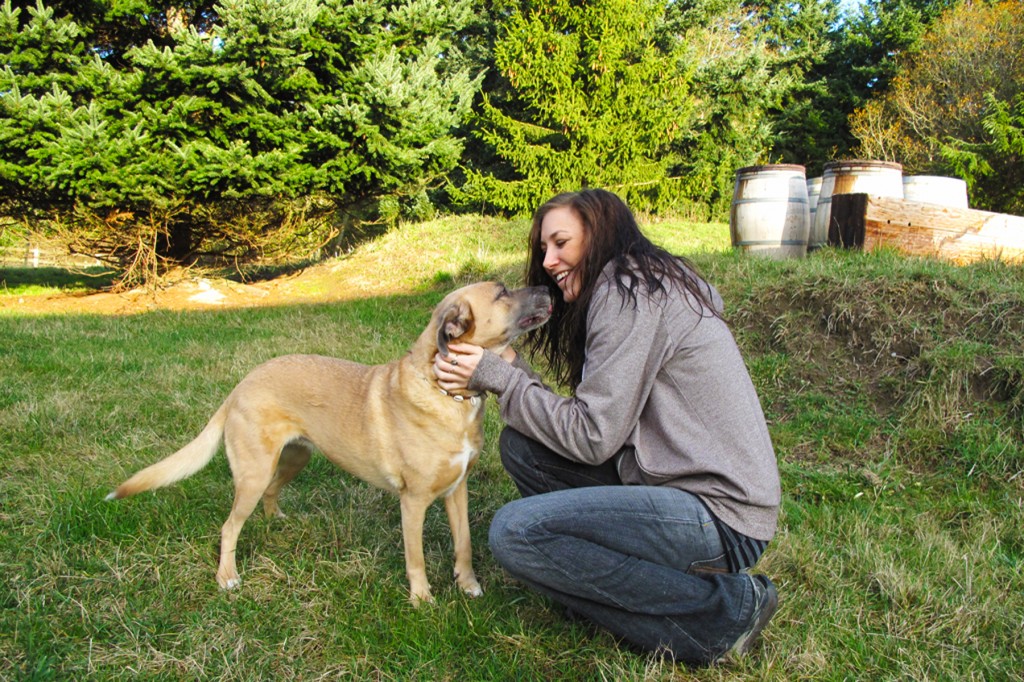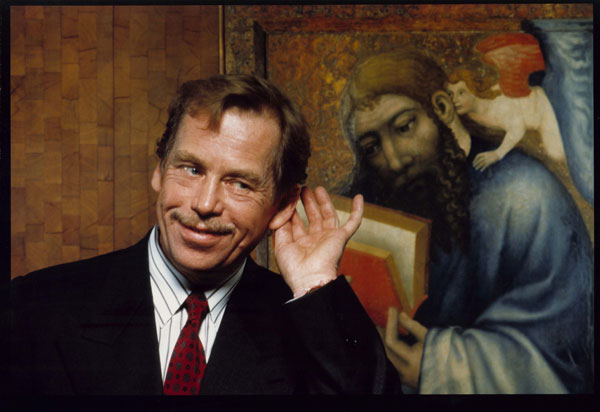
One has to be careful quoting Václav Havel’s plays: his characters lie through truths. The meaning of what they say invariably depends not on the words themselves, but who says them, in what circumstances. “The word is insidious,” Havel writes in his comments to the 1972 play Conspirators. “One moment it means a lot, an instant later it means nothing. There are people in whose mouths even the most beautiful word may mean the ugliest thing. The more a person loses his self, the more deftly he can transform truth into lie, and—paradoxically—through truth … deceive the world and himself.”
Havel’s state funeral last month at Prague’s St. Vitus Cathedral resembled, as the Czech foreign minister Karel Schwarzenberg had anticipated, “a grotesque situation” from one of the writer’s absurd plays. Presiding over the memorial was none other than Václav Klaus, the current Czech president and Havel’s political nemesis.
Grief over Havel’s death had brought the country to a standstill, as anyone who approved of the changes in 1989—the Velvet Revolution that brought a peaceful end to communist rule over Czechoslovakia—suddenly realized the degree to which Havel personified those changes and the once inconceivable possibilities they had opened. Into this national outpouring of warmth and nostalgia stepped Klaus, who had not said a good thing about Havel in fifteen years.
The first words of remembrance spoken at Havel’s funeral came from the mouth of his old foe. “Undoubtedly much is leaving with Václav Havel,” Klaus said. “At the same time, and in particular thanks to his consistent attitudes in life, there is much that is not leaving, and it is now incumbent upon us not to let it go. What is not leaving is the idea that freedom is a value worth sacrificing for, and that it is meaningful to engage in a struggle for truth, when one is convinced of it, even if it includes personal risks.” (A reader of Havel could not help but detect in Klaus’s eulogy echoes of the death speech delivered in his 1987 play Revitalization, conventionally translated as Redevelopment, an allegory about architects charged with the task of bringing an unplanned historic town in line with ordered modernity. “For only we can breathe meaning into this death by interpreting it as a challenge,” goes the sincere but self-deluded lament of the chief architect, Bergman—an exceptionally dubious character on Havel’s long roster of loathsome protagonists.)
It was left to Karel Schwarzenberg, Havel’s former chief of staff, to question the ways that the playwright’s own “struggle for truth” was, in death, being twisted to fit other agendas. His eulogy, which followed Klaus’s, was a deliberate answer to the current president. “Václav Havel, of course, knew that the word ‘truth’ can have a very narrow sense,” Schwarzenberg said. “He also knew that truth, seen in a narrow, self-centered way as the one and only truth, is the cause of discord and intolerance. That is why he took ‘Truth and Love’ as his motto, as only love can make us listen to the truth of another person, to the truth of others. Such love teaches us to be humble, and Václav Havel had more humility than we all do.”
‘Truth Will Touch Us’
Ever since the Czechs came together as a modern nation, the significance of the word pravda—truth—has been pitched to the life and death of Jan Hus, a Czech priest and scholar who sought to reform the Catholic Church a century before Martin Luther. “Truth … will prevail,” the last words Hus uttered before being burned at the stake, became the motto of the newly born nation of Czechoslovakia in 1918 and are still inscribed on the presidential banner of the Czech Republic. While staring down the communist regime at the end of last century, Havel and his fellow revolutionaries took to the streets with the chant, “Truth and love must prevail over lies and hatred.” Unlike most of his compatriots, Havel knew firsthand of the martyrdom that came with speaking truth: in 1977, his mentor and fellow spokesman for the dissident Charter 77 movement, the philosopher Jan Patočka, died from a stroke following a protracted police interrogation.
Havel saw love and truth not just as political slogans, but as principles of everyday conduct. His ability to listen with empathy to people of divergent opinions allowed him to draw together disparate groups and individuals opposed to the collaborationist regime that enveloped Czechoslovakia following the 1968 Soviet invasion. The nonpartisan Charter 77 movement, which Havel unassumingly led, began as a defense of the right to freedom of expression— specifically, a defense of the Czech rock group Plastic People of the Universe, put on trial essentially for having long hair and being apolitical. In that campaign, Havel found a platform for everyone: when one person’s freedom is violated, everyone’s freedom is violated. Many of Havel’s associates at the time criticized him for reaching out to staunch communists, who, following a takeover by the more pragmatic members of the party, found themselves ostracized for their beliefs. Havel fundamentally disagreed with those beliefs, but some of the communists, such as the writer Pavel Kohout, became Havel’s closest friends. On the other hand, colleagues of a similar political persuasion who compromised themselves for the sake of career became “former acquaintances.” (For a generation that came of age in the 1980s, kariéra had become the Czech word tinted with the most negative of connotations.)
As his friend Schwarzenberg pointed out, love in this way allowed Havel the dissident leader to listen to the truth of other people and build a broad-based movement. But what did an abstract term like “truth” actually mean to Havel? His decades of published writings provide some answers.
“It has been eighteen years since The Memorandum was first staged. I have not read it since then,” writes Havel in a 1983 note on the opening of his play at Vienna’s Burgtheater.
The Memorandum is, of course, not a play about Czechoslovak history, but a broader parable that aspires to say something about the human being and society in general. It is, however, rooted in—what else than?—the experiences that its author had in this tiny part of the world into which he was born and in which he was destined to live. That he at the same time—without suspecting this—predicted the future is not the work of his clairvoyance, but issues from the very miracle of what we mean by art, literature, drama, in which the author is always only the medium through which—in certain fortunate constellations—something speaks that is beyond him: that is to say, truth. The author does not discover this truth; truth reveals itself. He only opens himself to truth’s revelation by serving his cause. He allows himself to be carried by its inner logic and does not attempt to brazenly dominate it. It is therefore not the gift of absolute confidence, but more of stunned resignation that gives us the chance that we will touch truth, or, to be more precise, that truth will touch us.
According to Havel, chance and humility determine whether an author will be touched by truth. The two coincide. Not only does a writer need to be blessed with “fortunate constellations,” he also has to be humble enough to surrender himself to chance, to give up the consistencies he imposes on his subject, to be instead “carried by its inner logic.”
Truthful art must also arise from experience. What Havel does not stress here, but what seeps through his early writings, is his belief in the authenticity of that experience. Havel the young playwright idealized the heroic artist who was uncompromising in deed, word, and character, living his life boldly, with a deep knowledge of self. (Not surprisingly, Walt Whitman was Havel’s poet of truth in his teenage years.)
Havel clarified what he meant by artistic authenticity in his 1957 remarks on Bohumil Hrabal, later to become one of the greatest Czech novelists, but at that time an unpublished writer. Hrabal had a law degree, but had gone on to work all sorts of industrial jobs—at a railroad, a steel mill, a recycling plant. Havel was among the first to discern that Hrabal was blazing a new path for other Czech writers to follow, and he credited it to Hrabal’s authentic way of life:
Hrabal is not a writer who lives a rich life so that he has something to write about, but, on the contrary, a writer who writes because he is living this life, and this life again and again urges him to write. Hrabal is an ordinary person who writes, not a writer who lives like an ordinary person…. What sets him apart from other railroad or steel mill workers is the intensity with which he lives his life…. And this intensity of existence demands that he be distilled to the grain [projadřovat, a neologism] through writing.… [Hrabal] is not a writer-spectator … not a social novelist … not a beatnik … not a Hemingway type who deliberately and at great expense seeks out dangerous, make-or-break situations so that he can verify in them the authenticity of art. He is a type of artist … who realizes all his singularity in the intensity with which he carries out his fate.
Havel, who was born into a family of daring and wealthy entrepreneurs penalized by the communist regime for their success, never had a chance to be an ordinary person. He was a child of privilege, a writer-critic at heart, propelled by circumstances into (not so) ordinary walks of life—in other words, precisely everything that Hrabal was not. But Hrabal’s intensity, a stark contrast to the timidity of the country’s establishment writers, made an impression on Havel and a few others of his generation. Twelve years later, when he had become an enemy of the communist state and public channels of expression were closed to him, Havel would recast himself as an ordinary (and herein lies a crucial difference) citizen who writes. The writer’s vision shaped—and fortified—the ordinary citizen seeking justice.
The Devil’s Truths
The conduit through which Havel opened himself to truth was absurd drama. In 1963, his play The Garden Party, hailed by critics as the first Czech absurd play, premiered at the avant-garde Theater on the Balustrade, where Havel then worked as a stagehand. In a postscript to the published play, Jan Grossman, the theater’s artistic director, explained the appeal of absurd theater:
Absurd theater unmasks evil in its wider context, as an evil that is more dangerous because it has become “ordinary.” It filters into life without warning, furtively; it works through, at first sight, trivial means—the habitualized template, stock phrase, convention, dogma.… Absurd theater is analytical, and, if you want, coldly diagnosing. By principle it does not provide solutions. But this adherence to principle, I would say, does not stem from the certainty that a solution does not exist, but more from the conviction that a solution will never and nowhere, by nobody and by no means, be given. If theater aims to be a physician, it does not want to cure through conventional recipes, but by confronting the patient in the most drastic way with his always feasible annihilation. Not to conjure this annihilation, but to prevent it.… It assumes the role of the devil’s advocate. It takes the devil’s side, so that it may uncover the devil “who has concealed himself.”
In Temptation (1985), Havel’s agonizingly personal variation on the Faustus legend, the devil hides in plain sight. Foustka, a scientist at a research institute, comes to suspect that Fistula, a limping pensioner, is actually a visitor from the netherworld—one clue is the old man’s stench. Fistula explains that he suffers from athlete’s foot, which he treats with sulfur, and on each visit to Foustka’s home ostensibly changes in and out of slippers, which he brings along in a paper bag. Foustka never fully accepts this explanation. Bit by bit he arrives at the conclusion that Fistula’s disturbingly detailed knowledge of his personal dealings is due to preternatural powers, rather than utterly mundane connections. Yet the true cause of Foustka’s eventual downfall is not the devil’s trickery, but his failure to recognize and hold onto the one true relationship in his life. He begins to suspect his lover Vilma, a colleague at the institute, of divulging details from earlier conversations to their boss, who is bent on destroying Foustka. By doubting Vilma’s loyalty, Foustka loses her, the game, himself.
In Havel’s plays, the devil deceives through truth. Characters fixate on the abstractions of various pedestrian “truths” while forgetting their moral obligations to themselves and other people. “These are all truths that have ceased to be human truths—somebody’s truths,” he writes in a commentary on his play Conspirators.
These are truths which are not the result of authentic human realization and of authentic human experience, and which are therefore also not existentially guaranteed by the credibility and identity of their carriers, and by their courage to stand behind them even when they are not in accordance with immediate interest. These are all simply deadened, conventionalized “truths in themselves”—that is to say, truths in which contact with reality has been replaced by something more important: contact with ideological convention.
For people who embrace these external truths, Havel continues, “life moves from the real world of human existence into the semifictional world of stock phrases.” In this politicized environment, “words do not serve reality; reality serves words.” Human communication deteriorates to become a soulless exchange of “ideological stands,” and the flesh-and-blood human being, Havel concludes, ultimately transforms into a “thesis.”
(While his analysis here drew from his experiences living under totalitarianism, Havel saw communism as only a particularly obvious incarnation of the kind of modern society that corrodes moral principles. Consumerist culture, too, was one of his targets.)
In Havel’s view, truth in its fullest sense does not reside in objective facts, or logical propositions, or political ideologies. It is deeply personal: a way of life that upholds the authentic parts of our identities. Love, in turn, is how we authentically relate to other human beings. It is therefore the foundation of truth, rather than a consequence of it. If we as individuals are not rooted in a stable core of belief and relationships, we become caricatures of human beings—not unlike the characters in Havel’s plays.
Their lack of a vital sense of self does not prevent Havel’s characters from seeking out other, ersatz versions of love and truth to sustain them. But these attempts only further their estrangement. In the 1968 play The Increased Difficulty of Concentration, Huml is an inveterate womanizer, married with a mistress and lusting after more, unable to be true to any one relationship. Like Foustka, he is a scientist, but he rejects the scientific validity of an experiment to isolate the essence of the human being. In Huml’s view, science cannot quantify the human heart:
And I am afraid that the key to a genuine comprehension of the human self does not lie in a better or worse understood complexity of man as an object of scientific inquiry, but only—and only—in his complexity as a subject of human approximation, because the infinity of our own humanity is so far the only thing that can—however imperfectly—approximate the infinities of others. In other words, the personal, human, unique relationship that arises between two human selves has been up to now the only thing than can reveal—at least partly—the enigma of those mutual selves, while values such as love, friendship, empathy, compassion, and the unrepeatable and unsubstitutable human resonance—or, conversely, dissonance—are the only tools that this human touch employs. Through everything else we can more or less explain the human being, but we can no more than partly understand it, and therefore, no more than partly comprehend it.
Huml understands that the only truth worth knowing about another human being must be found through love, and yet his flawed nature prevents him from doing so.
Havel the playwright also knew to take a break from serious truths, should they become an obsession. He poked fun at himself in his plays—for example, in Audience (1975), through his alter ego, Ferdinand Vaněk, a dissident writer forced to work at a brewery (Havel had worked for a year rolling barrels at a small-town brewery). The brewmaster promises Vaněk a better job if he will write reports on himself to the secret police in the brewmaster’s name. The absurd situation culminates in this exchange between the two:
Vaněk: Sir, I am really thankful for all you did for me. I appreciate it because I know how rare such a stance is today. You, as they say, pulled a thorn out of my heel. I really don’t know what I would do without your help. That posting in the storage room would be a bigger relief for me than you may think, but I—excuse me—I surely cannot report on myself—
Brewmaster: What reporting? Who the hell is talking about reporting here?
Vaněk: It’s not about myself—it cannot hurt me—it’s about principle! Out of principle I surely cannot participate in …
Brewmaster: In what? Just say it! In what can’t you participate?
Vaněk: In a practice that I disagree with.
(Short, intense pause)
Brewmaster: Hmm. So you can’t. In the end, you can’t. That’s great! Now you really showed yourself! Now you proved yourself! (He gets up and excitedly walks around the room.) And what about myself? You will dump me in this, won’t you! You will sneeze in my face! I can be an asshole! I can waddle through the mud, I am not important, I am only your typical brewery idiot—but his lordship, he cannot participate. I can dirty myself, so that his lordship may remain clean…. Principles! Principles! … You always have a chance, but what chance do I have? No one will look after me, no one is afraid of me, no one will write about me. I am only worth being the dung from which your principles grow, looking for well-heated posts for your heroism, and, in the end, being ridiculed for all this! One day you will return to those actresses of yours, you will be bragging there about how you were spinning barrels, you will be a hero, but what about me? Where can I go back? Who will notice me? Who will appreciate what I did? What do I have from life? What awaits me? What?
Havel recognized the privilege that set him apart, the talent that made him more than just an “ordinary citizen.” To the end of his life he railed against the dangers of an inauthentic, estranged existence: his last play, Leaving (2007), skewered the cloistered egotism of politicians.
The idea that so inspired the martyr Jan Hus and his fourteenth-century followers was the heretical realization that each human being has an intrinsic capacity to know what a just, free, and beautiful life is. Six centuries later, Václav Havel used the medium of absurd plays to explore what happens to a human being who rejects the guidance of this inner compass. That real people all too often come to resemble characters in those plays, while their author was catapulted by life into roles he had not scripted, “issues from the very miracle of what we mean by art.”
Correction, March 31, 2012: Revised several passages in the essay, to clarify and correct the descriptions of the plays Revitalization and Temptation, to remove a claim that Havel wrote the “truth and love” motto “in homage to Hus,” to insert a brief discussion of the anti-career sentiment of Havel and his generation, to correct the timeframe when Havel became an “enemy of the communist state,” and to improve a few word choices. We regret the errors.
Jan Vihan Jan Vihan is a contributing writer for In The Fray.
- Follow us on Twitter: @inthefray
- Comment on stories or like us on Facebook
- Subscribe to our free email newsletter
- Send us your writing, photography, or artwork
- Republish our Creative Commons-licensed content

